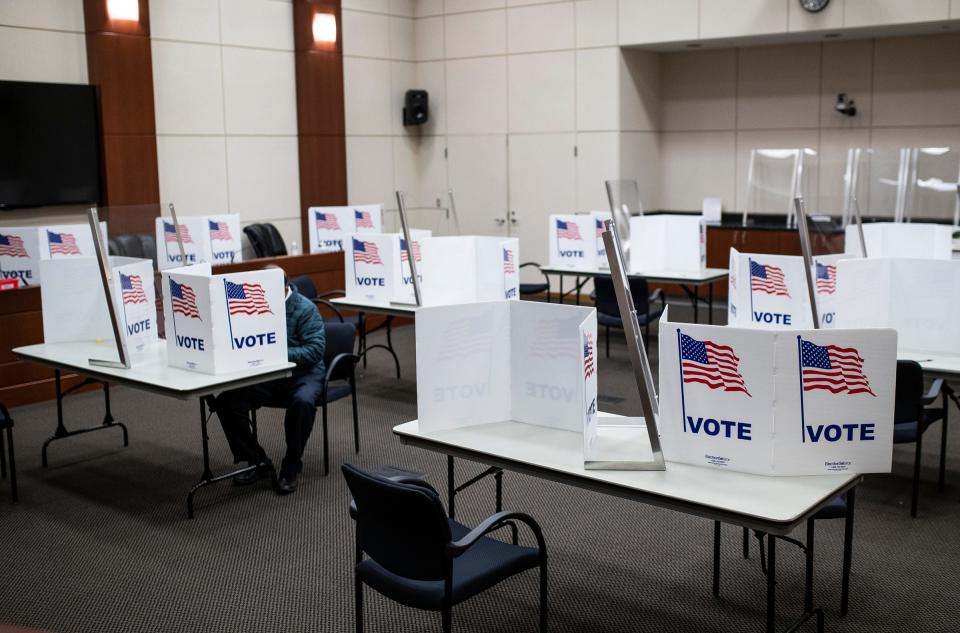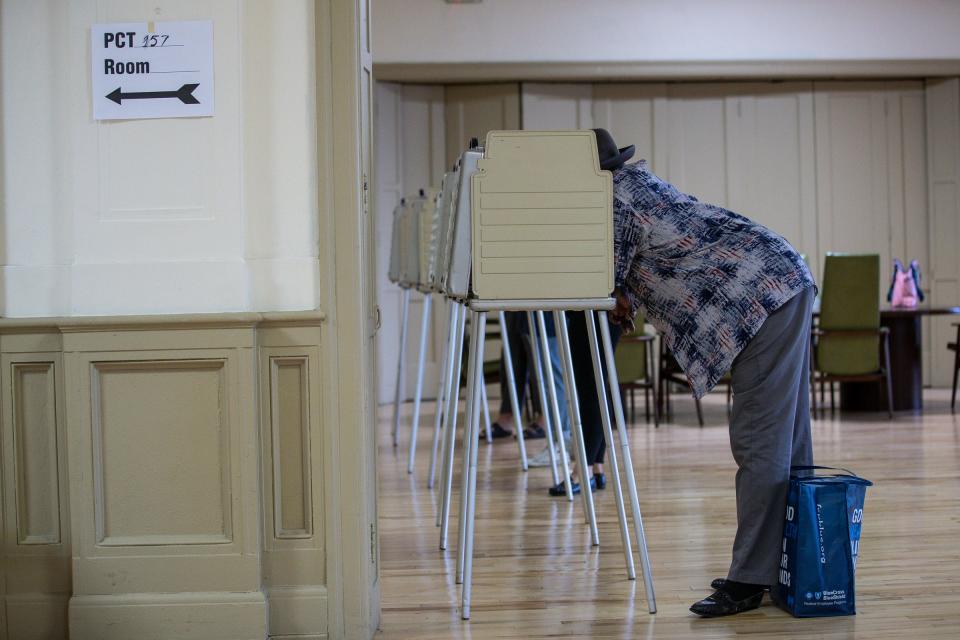How Michigan officials remove dead, unqualified voters from rolls
Michigan election officials rely on a list of registered voters to confirm that those showing up at polling locations on Election Day and those returning absentee ballots are eligible to participate in elections.
An accurate voter registration list is important, experts say. It helps ensure a smooth election, from determining how many polling locations to set up to making equipment purchasing decisions.
Some have suggested an up-to-date list may even boost voter turnout.
"If you have too many registered voters because they're not eligible to vote, it suppresses the turnout percentages, which I think sometimes actually suppresses it even more, becomes a self-fulfilling prophecy," former Kentucky Secretary of State Trey Grayson told Michigan House lawmakers during a recent hearing on voter rolls.
"We see lower turnout numbers, we think, 'oh, no one’s voting' and then that causes some folks to not vote," Grayson said.

But while a 100% accurate voter list may be desirable, it’s a fallacy, he said.
"You'll never have a completely accurate list," Grayson said. "It's the holy grail, but we can always do better."
Michigan — like other states — has systems in place to flag and remove ineligible voters. Among the main reasons election officials cancel a voter’s registration: the voter moves or dies or there's a duplicate record.
Here's a guide on who can vote in Michigan and what happens when someone is no longer eligible to vote in the state.
More:Absentee ballots now available in Michigan: Here's how to request, return one
More:Lawmakers pass series of election bills following negotiations on preprocessing ballots
Who's eligible to vote in Michigan?
Those registering to vote must meet the following criteria:
They must be a citizen of the U.S.
They must be at least 17.5 years old. (To cast a ballot, voters must turn 18 on or before Election Day.)
They must be a Michigan resident and resident of their city or township for at least 30 days when they vote. (Voters who move within the state of Michigan within 60 days before an election can vote in the precinct where they registered at their previous address.)
They cannot be currently serving a sentence in jail or prison
What happens when a voter moves?
If a voter moves to a different city or township in Michigan and updates the address on their driver's license or state ID, their registration is automatically updated as well.
If they stayed in the same city or township, they'll have their registration updated to the new address. If they move to a different Michigan city or township, their previous registration will be canceled and they'll be re-registered at their new address.
If a voter moves out of the state, there are a few ways to identify those individuals who need to be removed from the voter registration list.
The Michigan Department of State is alerted when a voter moves to a different state and surrenders their Michigan driver's license. The Michigan Secretary of State's Office receives the information and sends a notice of cancellation to the Michigan address where the individual registered. Their registration is canceled if they don't respond and don’t vote or request a ballot within two November elections held in even-numbered years.
If the postal service returns a piece of election mail sent to a registered voter as undeliverable, clerks send a notice of cancellation to the Michigan address where the individual registered. Their registration is canceled if they don't respond and don't vote or request a ballot within two November elections held in even-numbered years.

How are dead voters flagged and removed from the rolls?
Impersonating a voter − including a dead person registered to vote − is a crime. A person who falsely impersonates someone else in an election, including by voting or attempting to vote for someone else, is guilty of a felony punishable by imprisonment for up to four years, a fine of up to $2,000 or both.
Sometimes Michigan voters fill out and return their absentee ballot but then die before election day. Election officials are supposed to reject those ballots. A review by the Office of the Auditor General found 2,775 votes across eight recent elections − 0.02% of the total ballots counted − were cast by voters who died before Election Day. The vast majority − 98.5% − of those voters died within 40 days of the election, the auditor's review found.
The Social Security Administration sends deaths added to the "Master Death Index" to the Secretary of State's Office, and the Bureau of Elections cancels voter registrations of those listed on the index every week.
County clerks who also maintain death records currently inform local clerks of any deaths of registered voters in their municipality, so local election offices can cancel those voters' registrations. Under legislation recently passed by lawmakers, county clerks could also initiate the cancellation of those who died starting next year.

Has anyone who's not a U.S. citizen been listed as a registered voter?
"Previous administrations have acknowledged the existence of non-citizens registered to vote," Aneta Kiersnowski Crisp, press secretary for the Secretary of State's Office, wrote in an email.
"We cancel those registrations, and the automatic voter registration system ensures they are encountered any time a non-citizen conducts a driver's license or state ID transaction," she said.
Non-citizens registered to vote who cast a ballot "create a permanent record of a crime enabling their subsequent prosecution," she added.
What are the laws on waiting to cancel a voter suspected to be ineligible?
Michigan election law bars the cancellation of voters' registration based only on their failure to vote. Clerks must wait two consecutive general elections before canceling the registration of a voter who fails to vote and doesn't complete and return a notice of cancellation to confirm their address sent from the clerk in the jurisdiction where they're registered.
That's consistent with federal law requiring a waiting period before canceling the registration of voters who have failed to respond to a notice to confirm their eligibility to vote.
How many inactive voters are slated for cancellation in Michigan?
As of August 2022, there were 912,110 inactive voters registered in Michigan, according to a Bureau of Elections report. Voters are marked "inactive" when sent a notice based on information that they moved or the fact that they have not voted in more than six years.
There are currently more than 500,000 voters slated for cancellation, according to the Secretary of State's Office. Of those, more than 100,000 are slated to be canceled next year while almost 450,000 are slated to be canceled in 2025. Many of those slated for cancellation in 2024 were initially identified through a statewide absentee ballot application mailing two years ago.
In 2020, Secretary of State Jocelyn Benson sent absentee ballot applications to every registered voter in the state. It was the first statewide election mailing in over a decade, according to the Secretary of State's Office. Applications returned as undeliverable were used to send out notices of cancellation.
Voters who don’t respond to the notice or don't vote or request an absentee ballot within two federal elections will have their registrations canceled. Those marked "inactive" in voter file still maintain their registration and right to vote.
Those who are eligible to vote but have had their registrations canceled can re-register before or up to 8 p.m. on Election Day Nov. 8.
Clara Hendrickson fact-checks Michigan issues and politics as a corps member with Report for America, an initiative of The GroundTruth Project. Make a tax-deductible contribution to support her work at bit.ly/freepRFA. Contact her at chendrickson@freepress.com or 313-296-5743. Follow her on Twitter @clarajanehen.
This article originally appeared on Detroit Free Press: Michigan voter list maintenance, explained

